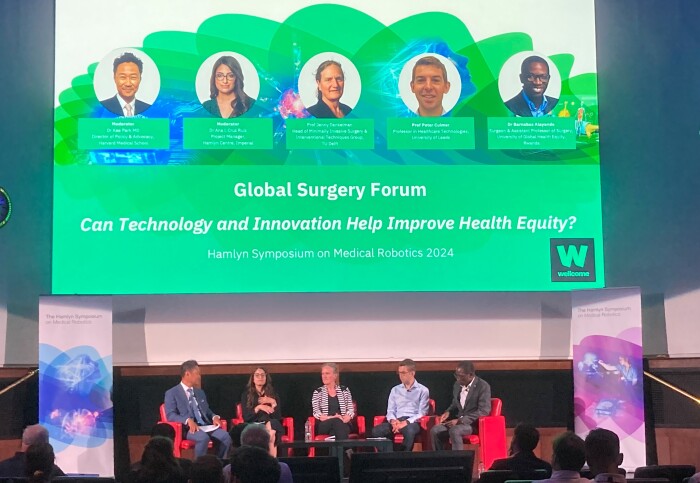Hamlyn Symposium - AI and Global Surgery
by Peter Howitt

Panellists at Hamlyn Symposium's Global Surgery Forum
The Hamlyn Symposium, the annual gathering organised by the Hamlyn Centre on all things surgery and robotics, took place last week.
The Institute of Global Health Innovation, of which the Hamlyn Centre is a Centre of Excellence, is sharing information on two sessions from the Symposium which will be of widespread interest: Artificial Intelligence and Global Surgery.
AI-Driven Health
The first was the Industry Forum on Artificial Intelligence (AI). Moderated by Dr Hutan Ashrafian (Imperial) it brought together Dr Umang Patel (Chief Clinical Information Officer at Microsoft), Dr Susan Thomas (Clinical Director at Google Health), Dr Rebecca Hope (UK Digital and Data Science Innovation Lead at Roche) and Dr Hugh Harvey (Managing Director at Hardian Health). The session was held under Chatham House rules, so this article does not directly attribute the points made.
The panel considered the potential for artificial intelligence to save time in back-office functions for doctors such as the capturing of medical notes. The concept of ‘Chief Algorithmic Officers’ was suggested as a necessary role within health systems. AI will become a fundamental element in medical and surgical practice and these clinical leaders would appraise and integrate AI into practice.

The challenges of AI equity were discussed, something IGHI has considered in a report. It was recognised whilst we should strive for AI bias reduction and reliability, human clinicians had their own biases and preconceptions.
On regulation in this new sector, it was accepted that this had to dove-tail with innovative developments. However, there are positive developments here, not least in a collaboration between the U.S., Canada and the UK on mutual recognition of AI technology assessments. There was also a call for transparency in approach, which was seen as crucial in developing trust in AI.
Global Surgery
The second session was the Global Surgery Forum, considering if technology and innovation can improve Health Equity. Dr Barnabas Alayande from Rwanda’s University of Global Health Equity, Professor Jenny Dankleman from TU Delft and Professor Peter Culmer from the University of Leeds were the panellists with Dr Kee Park (Harvard Medical School) and Dr Ana L Cruz Ruiz (Hamlyn Centre, Imperial) moderating.
5 billion people globally do not have access to safe surgery. This includes women who have suffered trauma through childbirth and violence and do not have access to corrective surgery.
The panellists spoke movingly from their own experience about the need for their skills. For instance, Dr Alayande talked about how he became a surgeon because as a young doctor he couldn’t save a mother left bleeding after childbirth in a rural health centre.
This is not a simple story of high income countries developing technology for passive recipients in Low and Middle Income Countries (LMICs). Professor Culmer has developed a gas-less laparoscopy in partnership with surgeons in rural India. He emphasised the importance of working in LMIC contexts to really understand needs. Professor Dankelman talked about the potential for open hardware access, with the example of a technology developed in Nepal being made available to clinicians in Kenya.
Having authored a Lancet Commission on Technologies for Global Health over a decade ago, it was great to hear of progress that had been made, albeit with still much unmet need. More researchers, engineers and surgeons are needed to tackle this challenge.
Ultimately, both sessions give hope for the future. There is huge potential for our technological ingenuity to deliver better healthcare both in the UK and globally.
Article text (excluding photos or graphics) © Imperial College London.
Photos and graphics subject to third party copyright used with permission or © Imperial College London.
Reporter
Peter Howitt
Department of Surgery & Cancer